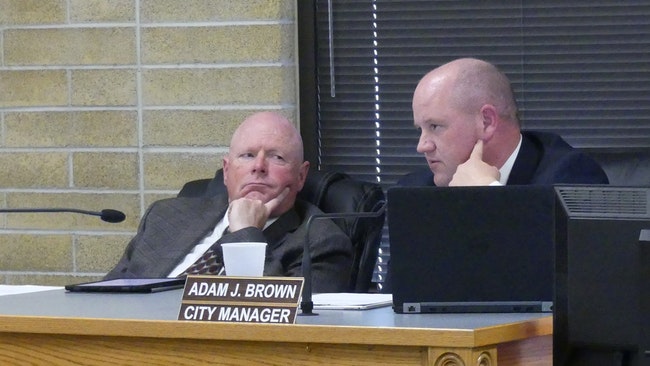
Larry Sullivan, left, city attorney for Ontario, inverted his legal advice from a previous meeting, allowing the council to eject Justus. (The Enterprise)
ONTARIO – Acting at the direction of the Ontario City Council, Police Chief Steven Romero ejected former councilor Marty Justus from the council audience Tuesday for silently displaying signs that questioned Mayor Riley Hill’s sobriety.
The decision to remove Justus from the public meeting capped weeks of tension between the former councilor and the city council. In a routine that began April 20, Justus has taken the stand each meeting during the public comment section of council sessions to denounce the behavior of Hill and Councilor Freddy Rodriguez, who has accused him falsely of being a child molester.
He then sits in the front row of the audience, aiming at the council placards that repeat his points.
The signs that got Justus thrown out of the meeting May 18 questioned whether Hill drank alcohol before council sessions and was sober during meetings.
Hill hasn’t responded publicly to the signs and he didn’t respond to messages seeking comment.
Justus said that Hill’s sobriety was fair game because of his complicity with Rodriguez’s accusations.
“If they want to talk about lies from the dais, I’ll talk about truths from the gallery,” he said in an interview with the Enterprise.
At a May 6 meeting, Justus held the placards for the first 30 minutes of the meeting before leaving. Later in the meeting, Councilor Ken Hart asked about maintaining decorum in the audience and requested that public attendees not show signs.
City Attorney Larry Sullivan told the council then that someone couldn’t be removed for “holding up a sign.”
An excerpt of the city recording of the May 18 Ontario City Council meeting shows the action to eject Marty Justus.
Justus’s routine was no different at Tuesday’s meeting.
He approached the front of the audience, sat down and began displaying the placards.
Less than a minute after the first sign was displayed, Councilor John Kirby raised a point of order and cited a section of the Ontario Council Rules and Procedures that reads, “any person making personal, impertinent, or slanderous remarks, or who becomes boisterous while addressing the council” shall be barred from the meeting.
Kirby then asked that Justus stop or be removed.
Sullivan indicated that he had received complaints from other councilors regarding Justus’s signs and that he could order the censorship of the signs if the council desired.
Rodriguez, facing a recall promoted in part by Justus, proposed a motion that the council “keep decorum by removing citizen and ex-councilman Justus.”
Before the motion was seconded, Sullivan said that at least one of Justus’s signs, which questioned the mayor’s sobriety, was a personal attack and was disruptive.
The council voted unanimously for Justus’ eviction. That included Kirby, Hill, Rodriguez, Hart and Councilors Sam Baker and Eddie Melendrez. When Justus indicated that he wouldn’t stop showing the signs, Romero asked him to leave.
“Larry was trying to walk a fine line. He determined that he was the decider as to when I could express myself and when I couldn’t,” said Justus.
Sullivan’s decision to agree with the council in removing Justus was an unexpected shift from his opinion just two weeks ago. At that meeting, when pressed by Hart if the rules allowed the council to kick Justus out, Sullivan said, “The answer is no. You cannot. Holding up a sign is not a breach of the peace.”
Sullivan said then that if the sign was slanderous, then the individual being slandered could separately sue, but that the council couldn’t remove someone unless they were interfering with its ability to conduct business.
“It might be difficult to establish that someone holding a sign and showing it to the councilors is interfering with the councilors’ ability to do their job,” Sullivan said at the May 6 meeting.
In an interview with the Enterprise, Sullivan said that one of the reasons he changed his stance was reviewing a federal court ruling.
In that case, a federal appellate court ruled that a city council in Santa Cruz, California, didn’t violate a citizen’s First Amendment rights by ejecting the man for raising his arm in a Nazi salute. The salute came after the mayor cut off a speaker during the public comment section.
“The First Amendment does not protect people who engage in a certain type of speech,” said Sullivan.
Sullivan said that Justus’s signs were insulting and derogatory. He didn’t feel that they were related to matters before the council.
“The actions of the Ontario City Council are concerning because it is not clear whether the council’s actions against the ex-councilor were taken in a neutral and reasonable, narrowly-tailored way consistent with how others have been treated or if the council was trying to silence the ex-councilor’s views, which is not constitutional,” said Sandy Chung, executive director of the ACLU of Oregon.
Kyu Ho Youm, the Jonathan Marshall First Amendment Chair at the University of Oregon School of Journalism and Communication, said that in the U.S. individuals can say almost anything against the government. He said that at a city meeting, the mayor represents that government.
“There is a difference between derogatory and defamatory content. The city attorney is walking a fine line by attempting to regulate what you can say towards officials,” said Youm.
Jim Oleske, professor at Lewis & Clark Law School, said that the section of the Ontario Council Rules and Procedures that Sullivan had referenced to justify ejecting Justus from the meeting “would have a very hard time surviving constitutional scrutiny.”
“The (language prohibiting) ‘personal, impertinent, or slanderous remarks?’” Oleske said. “A court would most certainly find that to be unconstitutionally overbroad in what it prohibits in terms of public speech during the public comment of a meeting.”
News tip? Contact reporter Joey Cappelletti at [email protected] or 616-610-3093.
PREVIOUS COVERAGE:
In an emotion-charged Ontario City Council meeting, Rodriguez confronted about personal conduct
Justus threatens to sue Ontario in response to Rodriguez’s claims of criminal conduct
Reports show Rodriguez slings unproven claims and Ontario mayor offers tip against former councilor
SAFEGUARD YOUR LOCAL NEWS
Take one action today to help the Enterprise grow and do more for the community through accurate, fair reporting.
SUBSCRIBE: A monthly digital subscription is $5 a month.
GIFT: Give someone you know a subscription.
ONE-TIME PAYMENT: Contribute, knowing your support goes towards more local journalism you can trust.




